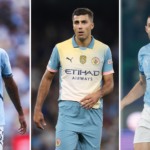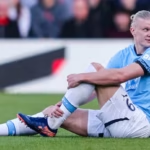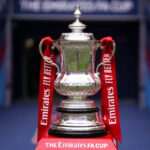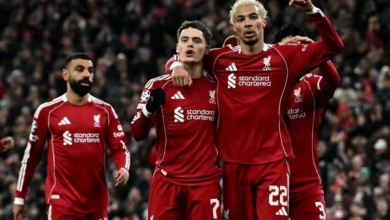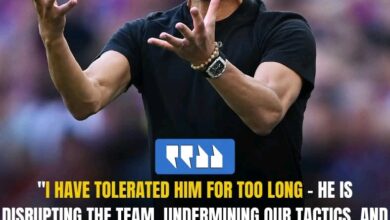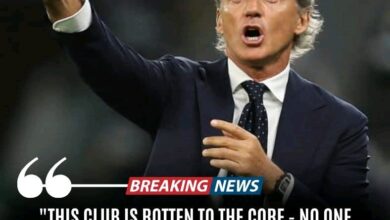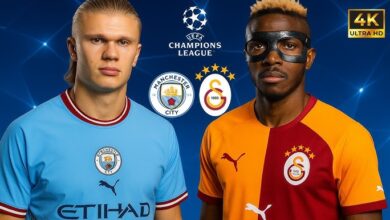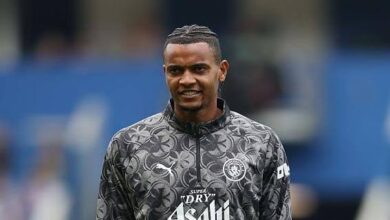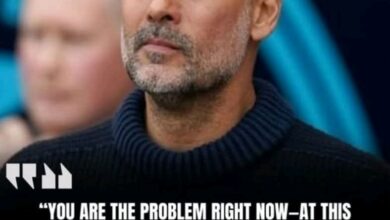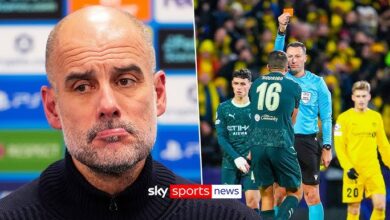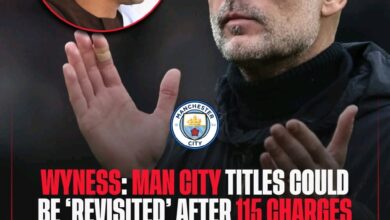Erling Haaland says there’s something he’s found really ‘boring’ at Man City this season

As Manchester City prepare for Saturday’s FA Cup final against Crystal Palace at Wembley Stadium, there’s an unusual atmosphere surrounding the club. The perennial Premier League champions find themselves in an unfamiliar position—fighting for a Champions League spot rather than celebrating another league title. For a club that has dominated English football for the past four seasons, this dramatic fall from grace has been difficult to process, not least for their talismanic striker, Erling Haaland.
In a remarkably candid interview with BBC Sport ahead of the cup final, Haaland expressed his frustration with City’s underwhelming campaign, describing the experience as “boring” and “not fun.” The Norwegian goal machine, who has himself struggled to match the extraordinary standards he set in his first two seasons at the Etihad Stadium, didn’t mince his words when assessing City’s disappointing season.
“We haven’t done good enough in the league. When you have won four league titles in a row, if you don’t win five, it’s not going to be a successful season,” Haaland stated with characteristic directness. “Those are the standards the club have set over the past couple of years. They can thank themselves for hopefully getting the Champions League spot, and winning the FA Cup is not a successful season. That is just how it is.”
The striker’s blunt assessment reflects the sky-high expectations at Manchester City under Pep Guardiola, where domestic domination has become the minimum requirement. City currently sit fourth in the Premier League table with just two matches remaining, a staggering 19 points behind leaders Liverpool, who secured the title with three games to spare. For a club that amassed 298 points across their previous four title-winning seasons, this represents nothing short of a collapse. With just two games remaining in the Premier League season, Manchester City find themselves in a precarious position:
City’s total of nine league defeats represents their worst return since the 2015/16 season—Guardiola’s first in charge—when they lost 10 times and finished fourth. What’s perhaps most concerning for City fans is the manner of some of those defeats, with the team looking uncharacteristically vulnerable in defensive transitions and lacking their usual ruthless efficiency in front of goal
Erling Haaland’s comments about finding the season “boring” may seem surprising coming from a player who has still managed to score 22 goals in 29 Premier League appearances. However, by his own extraordinary standards, this represents a significant drop-off. In his debut season, Haaland shattered the Premier League goalscoring record with 36 goals, following it up with 31 goals last term despite missing several games through injury.
This season has seen Haaland struggle with fitness issues, most notably an ankle injury suffered in late March that kept him sidelined for three crucial league fixtures—all of which City failed to win. His frustration has been compounded by a noticeable decline in service, with City’s midfield failing to create the quality of chances that Haaland thrives upon.”This season has been tough,” Haaland continued in his BBC Sport interview. “It is not nice to lose so many games, it is boring and not fun. That’s why we need to finish well and get a trophy.”
The Norwegian’s body language has at times betrayed his frustration, with television cameras frequently capturing him throwing his arms up in exasperation when passes have failed to reach him or when he’s been isolated for long periods. Some pundits have questioned whether City’s traditional possession-based approach truly maximizes Haaland’s explosive qualities, suggesting that his style might be better suited to a more direct, counter-attacking system.
Despite their league disappointments, City have an opportunity to salvage something from their season when they face Crystal Palace in Saturday’s FA Cup final. It would be City’s third consecutive FA Cup triumph and provide some consolation after their premature exits from both the Champions League (quarterfinals against Bayern Munich) and the Carabao Cup (fourth round against Tottenham).
“It is a good habit to reach Wembley and always important to win trophies,” Haaland noted. “We have the FA Cup final to play for, and in a horrific season, we still managed to do this; that says it all.”
The striker’s use of the word “horrific” to describe City’s campaign speaks volumes about the standards within the club. For most teams, challenging for Champions League qualification and reaching a major cup final would constitute a successful season. For City, it represents failure.
Former England manager Sam Allardyce believes City’s experience in high-pressure situations could prove decisive against Crystal Palace. Speaking to Sky Sports, Allardyce emphasized that “when you’ve been in these situations as many times as City have, it becomes second nature. Palace might have the enthusiasm and momentum, but City have the know-how.”
While City enter the final as favorites, there’s a growing belief that Crystal Palace could cause an upset. Under Austrian manager Oliver Glasner, who took over from Roy Hodgson in February, Palace have been transformed from relegation candidates to one of the most exciting teams in the Premier League.
Glasner’s high-pressing, transition-focused approach has brought the best out of Palace’s talented attacking players, with Michael Olise, Eberechi Eze, and Jean-Philippe Mateta forming a formidable front three. Their recent form has been nothing short of sensational, with seven wins from their last nine league games, including impressive victories over Manchester United, Tottenham, and Newcastle.
Haaland is well aware of the threat Palace pose, having experienced their quality firsthand earlier in the season. “Crystal Palace are a really difficult club to play against,” he acknowledged. “At Selhurst Park, we drew [2-2 in December], and they started really well at the Etihad [in City’s 5-2 win last month]. They are an amazing team with quality players.”
The 5-2 scoreline from that recent meeting at the Etihad is somewhat misleading. Palace raced into a 2-0 lead within 20 minutes before City mounted a remarkable comeback, with Phil Foden scoring a hat-trick. Haaland missed that game through injury but is acutely aware that City cannot afford another slow start at Wembley.
“We cannot fall two goals behind again,” he warned. “In a final, with so much at stake, it would be very difficult to overturn that kind of deficit against such a dangerous team.”
Liverpool legend Jamie Carragher has added fuel to the fire by predicting a Palace victory in Saturday’s showpiece. Speaking on Sky Sports’ Monday Night Football, Carragher explained his reasoning: “I’ve watched Palace transform under Glasner, and there’s just something about them right now. They play with no fear, and that’s exactly what you need against City.”
Carragher continued: “City look vulnerable in a way I haven’t seen for years. There’s a fragility about them defensively, and they’re not converting chances with their usual efficiency. I think Palace will catch them cold and win 2-1.”
Such predictions would have seemed outlandish in previous seasons, but they reflect the growing perception that City’s aura of invincibility has faded. The question now is whether Guardiola can rally his troops for one final push to secure some silverware from what has been, by their lofty standards, a desperately disappointing campaign
To understand Haaland’s frustration, it’s important to examine the wider context of City’s decline this season. Several factors appear to have contributed to their unexpected fall from grace.
First, there’s been a notable decline in the performance levels of key players. Kevin De Bruyne, long the creative heartbeat of the team, has struggled with injuries and inconsistency, completing 90 minutes in just nine league games this season. Rodri, crucial to City’s control of midfield areas, has looked fatigued after three years of relentless football without adequate rotation options.
Second, the departure of Ilkay Gündogan to Barcelona last summer created a void that has never been adequately filled. Gündogan’s intelligence, leadership, and knack for scoring crucial goals made him irreplaceable, and his absence has been felt acutely in the biggest games.
Third, City’s defensive solidity has evaporated. The partnership of Ruben Dias and John Stones, so dominant in previous campaigns, has been disrupted by injuries and loss of form. City have conceded 41 league goals this season—their worst defensive record under Guardiola
Finally, there are signs that Guardiola’s messages may not be resonating as powerfully as before. After eight intense years under the Catalan’s demanding leadership, some players appear mentally and physically exhausted. The precision and hunger that characterized City’s play at their peak have been replaced by a certain sluggishness and predictability.
For Haaland, accustomed to being the focal point of teams built to maximize his extraordinary finishing ability, this decline in collective performance has been particularly challenging. Without the usual quality of service from midfield, and with opposition teams increasingly focusing on cutting off his supply lines, the Norwegian has often cut an isolated figure
Despite the disappointments of this season, there’s little suggestion that Haaland is looking for an exit from the Etihad. In January, his agent, Rafaela Pimenta, negotiated a new nine-and-a-half-year contract that seemingly committed Haaland’s long-term future to the club. However, football insiders know that such contracts often include release clauses and performance-related break options.
Pimenta raised eyebrows last month when she told Italian publication Tuttosport that “Erling is committed to Manchester City, but in football, as in life, circumstances can change. We always keep our options open.” These comments, while not explicitly suggesting Haaland wants to leave, certainly leave the door ajar for a potential future move.
Much will likely depend on how City respond to this season’s setbacks. Guardiola has one year remaining on his current contract, and there’s growing speculation that next season could be his last at the club. If the Catalan coach does depart, it would undoubtedly influence Haaland’s thinking about his own future.
City’s owners, the Abu Dhabi United Group, have never been reluctant to invest when necessary, and a significant summer rebuild seems inevitable. Sporting Director Txiki Begiristain is reportedly targeting reinforcements in central midfield, central defense, and on the wings, with a budget of around £200 million available for transfers.
For Haaland personally, the FA Cup final represents an opportunity to end a difficult season on a positive note. Despite his relative struggles, he remains the Premier League’s second-highest scorer behind Liverpool’s Darwin Núñez, and a match-winning performance at Wembley would go some way toward salvaging his own campaig
Beyond its importance for City’s season, Saturday’s final carries significant historical weight for both clubs. For Crystal Palace, it represents just their third appearance in an FA Cup final and their first since 2016, when they were beaten 2-1 by Manchester United in extra time. The Eagles have never won a major trophy in their 119-year history, adding enormous emotional stakes to the occasion.
For City, it’s about maintaining their status as the dominant force in English football despite their league disappointments. A third consecutive FA Cup would equal a feat achieved by only two clubs in history—Blackburn Rovers (1884-1886) and Arsenal (2002-2004). It would also be their seventh major trophy in the past four seasons, a remarkable haul by any standard.
The final will be played in front of a capacity crowd of 90,000 at Wembley, with the worldwide television audience expected to exceed 500 million viewers across 150 territories. For Haaland, accustomed to performing on the biggest stages, it’s another opportunity to demonstrate the predatory instincts that have made him one of world football’s most feared strikers.
The contrasting styles of the two teams should make for a fascinating tactical battle. City, despite their relative struggles, remain committed to Guardiola’s principles of positional play, patient build-up, and suffocating possession. Palace, under Glasner, have embraced a more vertical approach, focusing on quick transitions and exploiting space behind opposition defenses.
The key battleground will likely be the wide areas, where Palace’s electric wingers Olise and Eze will look to isolate and attack City’s full-backs. Conversely, City will aim to dominate possession and gradually wear down Palace’s resistance through sustained pressure and intelligent movement.
Haaland’s role will be crucial. Against Palace’s likely defensive pairing of Joachim Andersen and Marc Guéhi, he’ll need to use his physical presence effectively, holding up play when necessary but also making the sharp runs in behind that have become his trademark. The service he receives will be critical—if City’s creative players can find their rhythm, Haaland could have a field day.
As Haaland and his teammates prepare for Saturday’s showdown, there’s a palpable sense that this match could define perceptions of City’s entire season. Victory would provide a silver lining to a cloudy campaign and maintain the club’s trophy-winning habit. Defeat would confirm this as Guardiola’s most disappointing season in Manchester and raise serious questions about the team’s future direction.
For Haaland personally, the stakes are equally high. Having described the season as “boring” and “not fun,” he needs to demonstrate that his appetite for success remains undiminished. A match-winning performance would silence any doubters and reaffirm his status as one of the game’s elite strikers.
Whatever the outcome, Saturday promises to be a fascinating spectacle between a team desperate to salvage their season and another hungry to make history. For the neutral, it’s a mouth-watering prospect. For Haaland and City, it’s an opportunity to transform a “horrific” season into one that at least ends with silverware.
As Haaland himself put it: “That’s why we need to finish well and get a trophy.” In 90 minutes at Wembley, we’ll discover whether City can deliver on that ambition or whether Crystal Palace will complete their fairy-tale journey by securing the first major trophy in their history.


